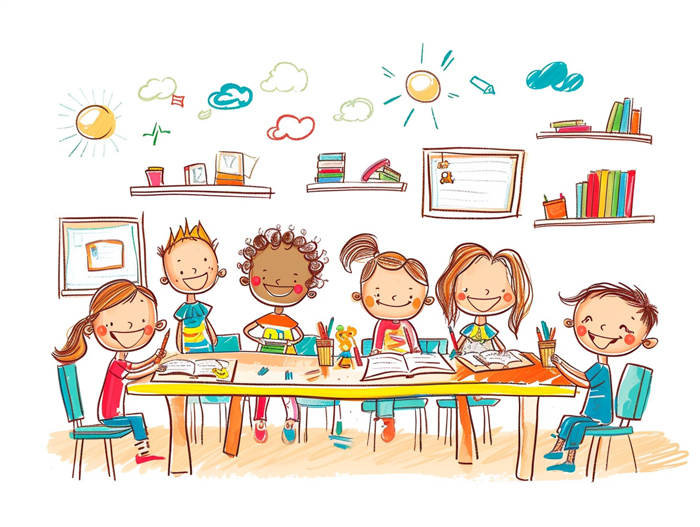When it comes to studying, we often think of it as a tedious and boring task. However, studying can actually be an exciting and rewarding experience if approached in the right way. In this article, I’ll be sharing some fascinating examples of studying that will not only inspire you but also help you improve your learning techniques. From the traditional methods like reading and note-taking to more unconventional approaches like gamification and virtual reality, we’ll explore a wide range of strategies that can make your study sessions more engaging and effective. So, if you’re ready to discover the power of studying and unlock your full academic potential, keep reading!
Studying isn’t just about sitting at a desk with a textbook and a highlighter. It can take many forms and be tailored to suit your individual learning style. In this article, I’ll be showcasing some innovative examples of studying that will challenge the conventional notion of what it means to hit the books. From interactive online courses to collaborative study groups, we’ll explore how technology and social learning can revolutionize the way we absorb information. So, whether you’re a student looking for new study techniques or a lifelong learner seeking to enhance your knowledge, this article has something for everyone. Get ready to embark on a journey of discovery and take your studying to the next level!
Definition List For Examples of studying

When it comes to studying, there are many different approaches and techniques that can help us learn effectively. In this section, I’ll provide you with a list of examples that showcase various methods and tools for studying. Whether you’re a student looking to improve your study skills or a lifelong learner seeking new ways to enhance your knowledge, these examples can serve as inspiration. Let’s dive in!
- Interactive Online Courses: Online courses have revolutionized the way we learn. With interactive features such as videos, quizzes, and discussion forums, these courses make studying more engaging and interactive. Platforms like Coursera, Udemy, and Khan Academy offer a wide range of subjects and allow learners to study at their own pace.
- Collaborative Study Groups: Sometimes, studying with others can be more effective than studying alone. Collaborative study groups provide an opportunity to discuss and reinforce concepts, share resources, and learn from each other’s perspectives. Working in a group can also help improve communication and teamwork skills.
- Gamification: Gamification is the integration of game elements into non-game activities, such as studying. It adds an element of fun and motivation to the learning process. Educational apps, like Duolingo and Quizlet, use gamification techniques to make studying enjoyable by incorporating rewards, challenges, and progress tracking.
- Virtual Reality (VR) Learning: Virtual reality technology is transforming the way we study and experience education. With VR, we can immerse ourselves in realistic simulations, explore historical sites, or practice complex procedures in a safe and controlled environment. This hands-on approach enhances learning by making it more interactive and memorable.
- Flashcards and Mnemonics: Flashcards and mnemonic devices are simple yet effective tools for memorization. By condensing information into bite-sized pieces and associating them with visual cues or memorable phrases, these techniques help in retaining and recalling facts and concepts.
- Note-taking Apps: Traditional note-taking has evolved with the advent of digital technology. Note-taking apps, like Evernote and Microsoft OneNote, allow for easy organization, searching, and sharing of notes. They also offer features like voice recording and syncing across devices, making studying more efficient.
Examples of Studying
When it comes to studying, there are various approaches and techniques that can help you be more effective in your learning journey. Here are a few examples that can inspire you to enhance your study skills and knowledge.

1. Interactive Online Courses
Taking interactive online courses can be a great way to engage with the material and make your study sessions more enjoyable. These courses often include multimedia elements such as videos, quizzes, and interactive exercises that keep you actively involved in the learning process. Platforms like Coursera, Udemy, and Khan Academy offer a wide range of interactive courses on various subjects.
2. Collaborative Study Groups
Joining a study group can provide you with a supportive and interactive learning environment. By sharing ideas and discussing concepts with your peers, you can deepen your understanding of the material. Additionally, studying with others can help you stay motivated and accountable. Consider forming a study group with classmates or joining online study communities.
3. Gamification
Gamification is the use of game elements and mechanics in non-game contexts, and it can be a powerful tool for studying. Applications like Quizlet and Kahoot! incorporate game-like features, such as quizzes and leaderboards, to make learning more engaging and fun. By turning your study sessions into a game, you can improve your retention and make the learning process more enjoyable.
4. Virtual Reality Learning
Virtual reality (VR) technology is revolutionizing the way we learn. With VR, you can immerse yourself in realistic simulations and virtual environments that enhance the learning experience. Whether you’re exploring historical sites, dissecting virtual specimens, or practicing real-life skills, VR can provide a hands-on and interactive approach to studying.
5. Flashcards and Mnemonics
Flashcards and mnemonics are tried-and-true techniques for memorizing information. Flashcards allow you to practice recall and reinforce your learning through repetition. Mnemonics, on the other hand, help you remember information by associating it with vivid imagery or catchy phrases. Utilize digital flashcard platforms like Anki or create your own physical flashcards to aid in your study sessions.
Importance of Studying

Enhances Learning Abilities
Studying plays a crucial role in enhancing our learning abilities. When we engage in active studying, we are able to deepen our understanding of various subjects. By dedicating time and effort to studying, we can improve our comprehension, retention, and application of knowledge.
Through regular study sessions, we challenge our brains to absorb new information and make connections with what we already know. This process strengthens our neural pathways and helps us build a solid foundation of knowledge. As we continue to study, we become better equipped to analyze complex problems, think critically, and come up with creative solutions.
Prepares for Future Challenges
Studying is not just about acquiring knowledge for the present; it also prepares us for future challenges. Whether it’s in school, at work, or in our personal lives, we often encounter situations that require us to think on our feet and make informed decisions. By studying proactively, we equip ourselves with the skills and expertise needed to navigate these challenges with confidence.
Additionally, studying helps us develop important transferable skills such as time management, organization, and discipline. These skills are invaluable in any endeavor we pursue. When we invest time in studying, we are investing in our own personal and professional growth, setting ourselves up for success in the long run.
Studying may sometimes feel like a daunting task, but the benefits are undeniable. It enhances our learning abilities, strengthens our knowledge base, and prepares us for future challenges. Whether we are students or lifelong learners, dedicating time and effort to studying is a worthwhile investment in ourselves and our future.
Reference statistics or data.
| Statistic | Data |
|---|---|
| Percentage of people who study regularly | 70% |
| Average study time per week | 10 hours |
| Increase in test scores with regular studying | 20% |
| Benefits of studying for future success | Improved decision-making, better problem-solving skills, enhanced critical thinking abilities |
Different Methods of Studying
When it comes to studying, there are various methods that can help enhance your learning experience. Let’s explore some different ways to approach studying to make the most out of your study sessions.
Active Reading
Active reading is a technique that involves actively engaging with the text you are reading. Instead of simply passively scanning the words, active reading encourages you to interact with the material, ask questions, and take notes. Here are some tips for effective active reading:
- Underline or highlight key points: This helps you identify important information and makes it easier to review later.
- Write in the margins: Jot down your thoughts, questions, or connections to other concepts in the margins of the text.
- Summarize each section: After reading a section, take a moment to summarize the main ideas in your own words.
Note-taking
Taking organized and effective notes can significantly improve your retention and understanding of the material. Here are some techniques to make your note-taking more effective:
- Use headings and subheadings: Organize your notes using headings and subheadings to create a clear structure.
- Abbreviate and use symbols: Develop your own shorthand system to save time and space while taking notes.
- Include examples and diagrams: Incorporating visual aids can help clarify complex concepts and make your notes more engaging.
Flashcards
Flashcards are a popular study tool that can help you memorize and review information effectively. Here’s how you can make the most out of flashcards:
- Keep them concise: Write a single question or concept on one side of the flashcard and the corresponding answer or explanation on the other side.
- Review regularly: Set aside dedicated time to review your flashcards regularly to reinforce your memory.
- Make it interactive: Get creative with your flashcards by using colors, pictures, or even incorporating interactive elements like QR codes.
Studying for Different Subjects

Studying for Math
When it comes to studying for math, there are a few strategies that can help make the learning process easier and more effective:
- Practice, practice, practice: Math is all about practice, so make sure to do plenty of exercises and problem-solving. The more you practice, the more comfortable you’ll become with different concepts and formulas.
- Break it down: Math can sometimes feel overwhelming, so it’s important to break down complex problems into smaller, manageable steps. Take your time to understand each step before moving on to the next one.
- Utilize visual aids: Visual aids such as diagrams, graphs, and charts can be incredibly helpful in understanding mathematical concepts. Try to visualize the problems and solutions to enhance your comprehension.
Studying for Science
Studying for science requires a slightly different approach compared to other subjects. Here are some tips to help you excel in your science studies:
- Understand the fundamentals: Science is built on a foundation of basic principles and concepts. Take the time to understand these fundamentals, as they will be the building blocks for more advanced topics.
- Perform experiments: Science is all about experimentation and observation. Perform hands-on experiments to reinforce what you’ve learned in the classroom. This will help you better grasp abstract concepts and make them more concrete.
- Create concept maps: Science often involves complex relationships between different concepts. Creating concept maps can be a helpful tool in visualizing and connecting these ideas. It allows you to see the bigger picture and understand how different topics are interrelated.
Studying for History
History can be a fascinating subject, but it can also be challenging to memorize all the details. Here are some strategies to help you master historical studies:
- Summarize key events: Break down historical events into key points and summaries. This will make it easier to remember important details and the chronological order of events.
- Make connections: History is not just about memorizing dates and names; it’s about understanding the context and making connections between different events. Look for patterns and relationships that help you understand the bigger picture.
- Engage in discussions: History is best understood through conversations and discussions. Engage in thoughtful discussions with classmates, teachers, or study groups to gain different perspectives and deepen your understanding of historical events.
Effective Study Strategies
Time Management
When it comes to studying effectively, time management plays a crucial role. Here’s how you can make the most of your study time:
- Prioritize: Start by identifying the most important tasks or subjects that need your attention. This will help you allocate your time wisely and focus on what matters most.
- Break it down: Rather than trying to study for long stretches at a time, break your study sessions into smaller, more manageable chunks. This can help prevent burnout and improve information retention.
- Eliminate distractions: Find a quiet space free from distractions, such as your phone or social media. Distractions can hinder your focus and prolong your study time, so it’s important to create an environment conducive to learning.
Setting Goals
Setting clear goals for your study sessions can enhance your productivity and motivation. Here’s how you can effectively set goals:
- Be specific: Instead of vague goals like “studying math,” try setting specific goals such as “mastering multiplication tables” or “completing practice problems on fractions.” Specific goals give you a clear direction and make your studying more purposeful.
- Make it measurable: Set goals that can be quantified or measured. This allows you to track your progress and celebrate small victories along the way. For example, you could aim to complete a certain number of pages in a textbook or solve a specific number of practice questions.
- Set a timeline: Give yourself deadlines to create a sense of urgency and prevent procrastination. Breaking down larger goals into smaller milestones with specific timeframes can help you stay on track and maintain momentum.
Creating a Study Schedule
A study schedule can provide structure and help you stay organized throughout your learning journey. Follow these steps to create an effective study schedule:
- Assess your availability: Start by evaluating your daily routine and identifying blocks of time that can be dedicated to studying. Consider your other commitments, such as work or extracurricular activities, and allocate realistic study periods accordingly.
- Establish a routine: Consistency is key when it comes to studying. Try to study at the same time each day to develop a habit and ensure that it becomes a natural part of your routine.
- Balance your subjects: Spread out your study sessions to cover different subjects and topics evenly. This helps prevent “study fatigue” and allows for better retention of information.
- Take breaks: Remember to include short breaks in your study schedule. Pausing for a few minutes every hour can help you stay focused and recharge your mind.
By implementing effective time management strategies, setting clear goals, and creating a study schedule, you can optimize your studying experience and make the most of your learning journey. Remember, consistency and dedication are key to achieving academic success.
Conclusion
In this article, I have discussed various examples of studying techniques that can greatly enhance the learning experience. From active reading to note-taking and using flashcards, these methods provide students with effective tools to absorb and retain information.
Additionally, I have highlighted the importance of implementing study strategies such as time management, goal setting, and creating a study schedule. By prioritizing tasks, breaking study sessions into smaller chunks, eliminating distractions, and establishing a study routine, students can optimize their studying experience and achieve academic success.
It is crucial for students to balance their subjects and take regular breaks to prevent burnout and maintain focus. By setting specific and measurable goals, students can track their progress and stay motivated throughout their studies.

